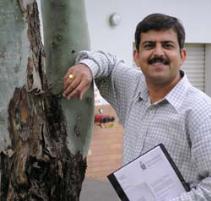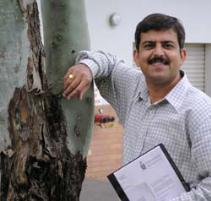Plant researcher branches out on metal extraction project
Published on 11 March, 2004
Indian-born researcher Naveen Bhatia is looking forward to spending two years in Japan, thanks to being nominated for a major post-doctoral fellowship.
He will use the time to expand his CQU research on the use of plants to extract minerals from soils.
At CQU, for his PhD, Mr Bhatia worked on a rare, small herb (Stackhousia tryonii) that is effective in soaking nickel out of Central Queensland's serpentine soils, to enable them to be used for crops. So far, these (serpentine) soils have a limited use in pasture development and wildlife conservation.
 Using molecular biology tools, he hopes to identify, isolate and clone this ‘nickel-hungry’ herb\'s genetic trait for use in higher biomass shrubs and trees.
Using molecular biology tools, he hopes to identify, isolate and clone this ‘nickel-hungry’ herb\'s genetic trait for use in higher biomass shrubs and trees.
His post-doctoral research in Japan could eventually lead to crops of metal-extracting (phytomining) plants, which could be harvested, ashed and smelted to recover metal (for example, from mine tailings and low-grade mineral ore sites).
Only 20 of the Japan Society for the Promotion of Science (JSPS) fellowships were available.
Mr Bhatia's nomination is backed by the Australian Academy of Science and the Australian Research Council, and will be announced formally by Australian Science Minister Hon Peter McGauran.
The JSPS funding will cover all of Mr Bhatia\\\'s travelling and living expenses, including conference costs, overseas travel accident and sickness insurance coverage, for the two years he is based at Mie Uni in Tsu-shi. Furthermore, a research grant of up to 3,000,000 yen is also available to cover cooperative research-related expenses.
 Mr Bhatia has recently completed his PhD with CQU, supervised by Dr Nanjappa Ashwath, Professor David Midmore and Associate Professor Kerry Walsh. Another supervisor, Professor Alan Baker from Melbourne University, is considered the world\\\'s leading authority in this field.
Mr Bhatia has recently completed his PhD with CQU, supervised by Dr Nanjappa Ashwath, Professor David Midmore and Associate Professor Kerry Walsh. Another supervisor, Professor Alan Baker from Melbourne University, is considered the world\\\'s leading authority in this field.
Mr Bhatia\'s wife Poonam, who also submitted her PhD thesis (biotechnology; Plant Sciences Group, CQU) in November 2003, will also travel to Japan, and hopes to secure fellowship support for her post-doctoral research.
Mr Bhatia has plans to return to Australia after finishing his post-doctoral fellowship in Japan, and put his experiences into use for the benefit of Australian community.
Last week, his PhD thesis was approved by the Chair of Examiners.

